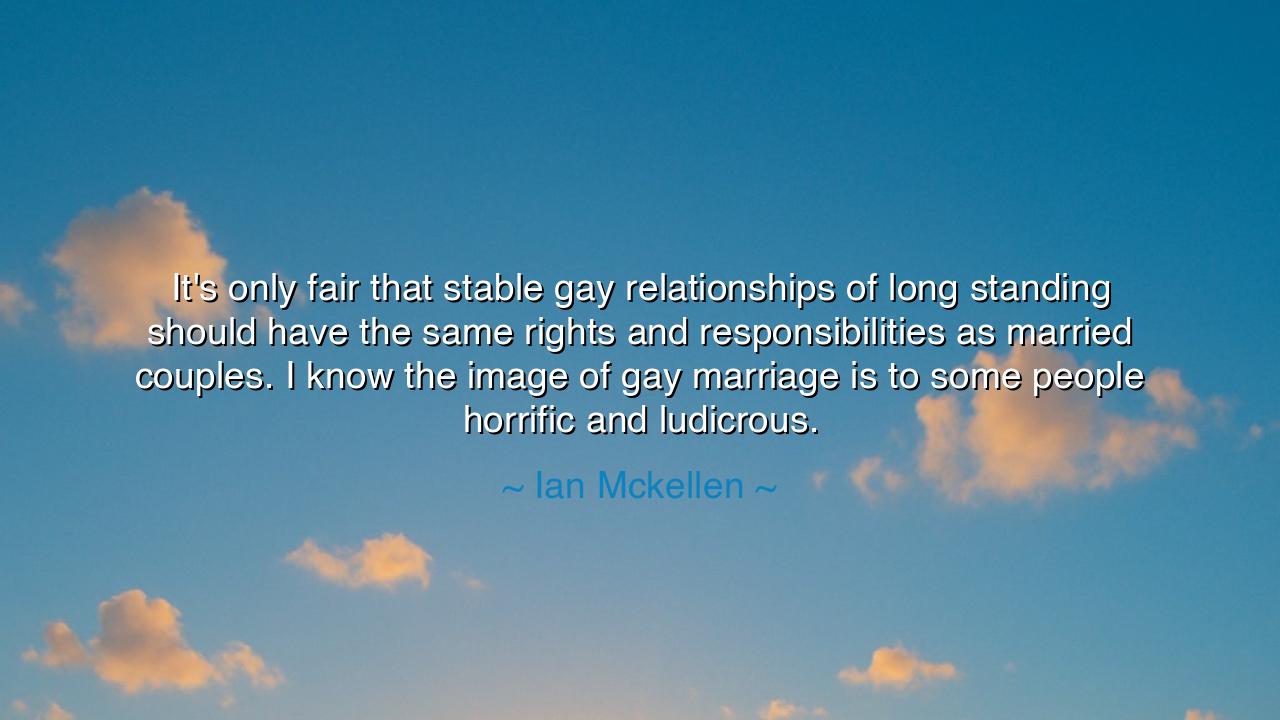
It's only fair that stable gay relationships of long standing
It's only fair that stable gay relationships of long standing should have the same rights and responsibilities as married couples. I know the image of gay marriage is to some people horrific and ludicrous.






When Ian McKellen said, “It’s only fair that stable gay relationships of long standing should have the same rights and responsibilities as married couples. I know the image of gay marriage is to some people horrific and ludicrous,” he was speaking not merely as an actor or public figure, but as a seer of justice — one who looked upon a world divided by fear and sought to reconcile it with compassion. His words carry the rhythm of conscience, the tone of one who has known both exclusion and hope, and the courage to speak against the tide. In this statement, McKellen confronts the ancient question of fairness — the balance between love and law, between society’s traditions and the individual’s truth.
The origin of this quote lies in the late twentieth century, when McKellen, one of the world’s most celebrated actors, publicly came out as gay and became an advocate for LGBTQ+ equality in Britain and beyond. At that time, same-sex marriage was still considered taboo, even mocked, by many. McKellen’s words emerged in defiance of that prejudice, as a plea for empathy rooted in reason. He framed the issue not as a rebellion against tradition but as an appeal to fairness and shared humanity. By acknowledging that some saw gay marriage as “horrific and ludicrous,” he did not dismiss their discomfort — he illuminated it, showing how fear distorts justice when it refuses to see love as equal.
To speak of rights and responsibilities is to speak of dignity. McKellen reminds us that equality is not merely about privilege, but about partnership — about recognizing that the bonds of love and devotion between two people of the same sex carry the same moral weight as those between a man and a woman. The word “stable” in his sentence reveals his wisdom: he was not seeking novelty or indulgence, but parity — the right to live responsibly, to care, to commit, and to be recognized by the society one contributes to. This, in essence, is what fairness demands: that the measure of a relationship be its fidelity and compassion, not its conformity to old expectations.
History itself offers testimony to McKellen’s truth. In ancient Greece, philosophers such as Plato and Aristophanes wrote of love between men as a reflection of the soul’s divine yearning — a bond of intellect and virtue. Yet in later centuries, dogma buried that understanding beneath silence and condemnation. McKellen’s words, then, are not a cry of rebellion, but a restoration — a recalling of the sacred recognition that love, in all its forms, is a force of creation and moral growth. He stands among those ancient teachers who knew that when society denies the legitimacy of love, it weakens its own soul.
The courage to speak as McKellen did was not without cost. In his early years, he lived in an era where being openly gay could end a career. Yet he chose truth over comfort, and in doing so, transformed himself into both artist and activist. His advocacy helped pave the way for legal reforms in the United Kingdom, including the repeal of discriminatory laws and, eventually, the recognition of same-sex marriage. Thus, his quote is not a mere opinion — it is the summation of a life that bore witness to the transformation of fear into understanding, and prejudice into progress.
But McKellen’s insight also holds a warning. He saw that even as progress advances, many still cling to the idea that equality for one group diminishes another. His words invite reflection: that fear, not love, is what truly corrupts society. Those who reject fairness out of discomfort forget that the health of civilization lies not in its capacity to exclude, but in its ability to expand compassion. By granting equal rights to those once marginalized, society does not lose its strength — it refines it.
Let this be the lesson passed down to the generations that follow: fairness is the true foundation of civilization, and love is its purest teacher. To deny love its rightful dignity is to wound the heart of humanity itself. Therefore, let each person strive to see not with the eyes of custom, but with the wisdom of empathy. Let the world remember Ian McKellen’s quiet defiance — that to stand for fairness, even when mocked or misunderstood, is to act in harmony with the eternal law of justice. For in the end, every act of equality brings the world closer to its divine balance, where love — in all its forms — is honored as sacred, enduring, and wholly human.






AAdministratorAdministrator
Welcome, honored guests. Please leave a comment, we will respond soon